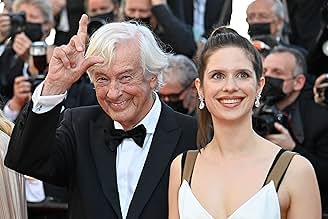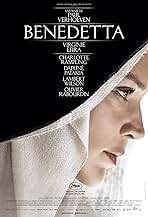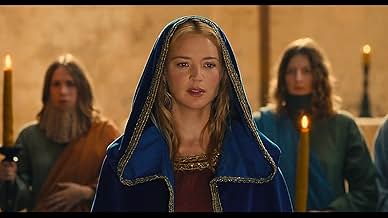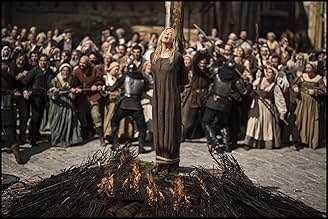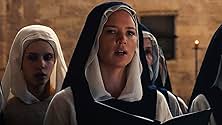A 17th-century nun in Italy suffers from disturbing religious and erotic visions. She is assisted by a companion, and the relationship between the two women develops into a romantic love aff... Read allA 17th-century nun in Italy suffers from disturbing religious and erotic visions. She is assisted by a companion, and the relationship between the two women develops into a romantic love affair.A 17th-century nun in Italy suffers from disturbing religious and erotic visions. She is assisted by a companion, and the relationship between the two women develops into a romantic love affair.
- Awards
- 3 wins & 21 nominations total
Featured reviews
The basic virtue of film is its high realism. Sure, exposed with the tools of Paul Verhoeven. A film about faith, power, manipulation, survive, leadership and a splendid portrait of counter reformation atmosphere, from innocence to faith as refuge , from the discover of lust to the dark side of a person appartaining to one world.
The second virtue can be the impecable work of Charlotte Rampling as Mother Felicita.
Not the less, the performance of Daphne Patakia , remembering, at the first look, Rosalinda Celentano in the Passion Of Christ, mixing wildness and profound innocence, lovely simplicity and fears .
About Virginia Efira , her beauty seems for me the basic tool to build the character. I do not ignore the performance but the beauty represents just the axis for give a fair portrait of Beneditta.
The statue of Holy Virgin was, I admitt, a serious motif to be scandalized . But, in same measure, I see its use as a portrait of lost of the innocence of childhood.
I am conscient than I saw this film as Greek Orthodox Christian . The Catholic world, in so many stories, is discovered in this film almost scene by scene. That is the reason for who I admired its realism. Because it is a panel with so familiar pieces defining, sure, in popular mind, Catholicism.
A beautiful film, having as sin the not most inspired construction of visions. But, sure, the message is the significant one and the large gallery of portraits , few like Mother Jacopa being useful for remind, as delicate sketch, not comfortable truths.
The second virtue can be the impecable work of Charlotte Rampling as Mother Felicita.
Not the less, the performance of Daphne Patakia , remembering, at the first look, Rosalinda Celentano in the Passion Of Christ, mixing wildness and profound innocence, lovely simplicity and fears .
About Virginia Efira , her beauty seems for me the basic tool to build the character. I do not ignore the performance but the beauty represents just the axis for give a fair portrait of Beneditta.
The statue of Holy Virgin was, I admitt, a serious motif to be scandalized . But, in same measure, I see its use as a portrait of lost of the innocence of childhood.
I am conscient than I saw this film as Greek Orthodox Christian . The Catholic world, in so many stories, is discovered in this film almost scene by scene. That is the reason for who I admired its realism. Because it is a panel with so familiar pieces defining, sure, in popular mind, Catholicism.
A beautiful film, having as sin the not most inspired construction of visions. But, sure, the message is the significant one and the large gallery of portraits , few like Mother Jacopa being useful for remind, as delicate sketch, not comfortable truths.
Some film critics in Greece thought that this movie is a hybrid of parody and satire in its attitude towards organized religion. I disagree. Although the treatment of religious themes is rather blasphemous by pietistic standards the amount of human misery and suffering portrayed does not allow the viewer to conceive the movie as satire at least solely as such. Surely the religious visions and the sexual adventures of Benedetta treat religion irreverently but the consequences for her and her protégé Bartolomea have nothing humorous about them. In that time, unlike ours - at least in the West- no jokes were allowed concerning religion.
Misery, violence, intrigue abound in the plot and lust, although explicit, is just one of the sins portrayed. Ambition, struggle for power and precedence, avarice are the prevailing motives of the characters. Christian charity pales before those demonic passions although it is not totally absent.
The plight of the poor, the intrigues of the powerful, the omnipresence of the plague, the violence of the soldiery offer a bleak picture of society. One is reminded of Flesh and Blood by the same director situated in about the same historical period. Both have a central heroine with superb survival skills to help her navigate through insurmountable adversities.
Humour and satire exist but the general atmosphere is so ominous, so laden with menace, violence and disease that you are left saddened with the misery inherent in the human experience of 17nth century Tuscany. Nothing betrays the artistic splendour of the Renaissance, just a bleak struggle for survival and mastery, for power and precedence, for wealth and prestige where Christianity is used to serve those ulterior motives.
It is a sad movie. That said Virginie Efira and Daphne Patakia are gorgeous both artistically and sexually. But I think Charlotte Rampling in the role of the abbess gives the more memorable performance as a character full of ambiguity and contradictions. Lambert Wilson shines as the satanic nuncio although his character is rather flat in his evil propensities.
The costumes and the representation of the era are superb and the religious visions of Benedetta are far-fetched and subversive. Pietistic believers are going to be offended and will probably say: would he dare to do the same with Muslim religious symbols? But I do not think that the movie is anti-Christian. It shows how lofty ideals are used by flawed humans to further very earthly ambitions.
It is true though that without divine solace the society portrayed by Benedetta would be impossible to live in. Watch the movie and form your own opinion.
Misery, violence, intrigue abound in the plot and lust, although explicit, is just one of the sins portrayed. Ambition, struggle for power and precedence, avarice are the prevailing motives of the characters. Christian charity pales before those demonic passions although it is not totally absent.
The plight of the poor, the intrigues of the powerful, the omnipresence of the plague, the violence of the soldiery offer a bleak picture of society. One is reminded of Flesh and Blood by the same director situated in about the same historical period. Both have a central heroine with superb survival skills to help her navigate through insurmountable adversities.
Humour and satire exist but the general atmosphere is so ominous, so laden with menace, violence and disease that you are left saddened with the misery inherent in the human experience of 17nth century Tuscany. Nothing betrays the artistic splendour of the Renaissance, just a bleak struggle for survival and mastery, for power and precedence, for wealth and prestige where Christianity is used to serve those ulterior motives.
It is a sad movie. That said Virginie Efira and Daphne Patakia are gorgeous both artistically and sexually. But I think Charlotte Rampling in the role of the abbess gives the more memorable performance as a character full of ambiguity and contradictions. Lambert Wilson shines as the satanic nuncio although his character is rather flat in his evil propensities.
The costumes and the representation of the era are superb and the religious visions of Benedetta are far-fetched and subversive. Pietistic believers are going to be offended and will probably say: would he dare to do the same with Muslim religious symbols? But I do not think that the movie is anti-Christian. It shows how lofty ideals are used by flawed humans to further very earthly ambitions.
It is true though that without divine solace the society portrayed by Benedetta would be impossible to live in. Watch the movie and form your own opinion.
At the age of 83, it is wonderful to see Paul Verhoeven mojo's still on fire after all these years. His latest offering Benedetta (2021), a provocative lesbian affair in a 17th-century nunnery set amidst the bubonic plague is more than erotic drama as Verhoeven manages to mix dogmas of faith & superstition in the narrative. It definitely lives up to its billing as one of his best film, exceptionally well made all around and stays true to form throughout. Along the way, it has a true and sad story to tell, but it is an entertaining film with funny characters and Jesus Christ cameo with a sword-slinging fight sequence. The film might feel inconsistent in its satire on the Catholic Church but it definitely hits hard where it counts. The best is in the 2nd half, there is an intriguing balance between the satire and the obscene, waddling constantly between the two, with wild moments.
The film has few shortcomings, but they are completely outweighed by its main advantage - cinematography, soundtrack and the wacky screenplay. On the acting side we have a stable interpretive work of all those involved, but the one who stands out the most is Virginie Efirahas, some of the best acting of the year.
Overall, 'Benedetta' is an Paul Verhoeven movie at its best. It is a mischievous film in the very spirit of Ken Russell's The Devils (1971) and Nunsploitation classics. It might feel off-putting before becoming entertaining and it succeeds in doing this in all aspects.
The film has few shortcomings, but they are completely outweighed by its main advantage - cinematography, soundtrack and the wacky screenplay. On the acting side we have a stable interpretive work of all those involved, but the one who stands out the most is Virginie Efirahas, some of the best acting of the year.
Overall, 'Benedetta' is an Paul Verhoeven movie at its best. It is a mischievous film in the very spirit of Ken Russell's The Devils (1971) and Nunsploitation classics. It might feel off-putting before becoming entertaining and it succeeds in doing this in all aspects.
It will be called subversive. There will be appreciation. There will be hate and there will be love, but if people took their time to read Paul Verhoeven's book about Jesus of Nazareth as a historical figure, they shouldn't be surprised about this film, which is based on a true story, Judith Brown's study Immodest Acts, about the rise and fall of the lesbian nun Benedetta Carlini.
I had so much fun watching this movie. Great acting, excellent story. Peak Paul Verhoeven, even at the age of 82. Apart from the usual Verhoeven elements, there are profound questions about the State and the Church, especially regarding interpretation of the Bible and the determination of God's will. Benedetta is a believer in a cynical world. For certain reasons, she needs a private place - in a world where 'private' isn't highly appraised and because of that, she'll have to turn to cloister politics. Benedetta is a great film about morals and who decide about them and when. I'll re-watch it very soon.
I had so much fun watching this movie. Great acting, excellent story. Peak Paul Verhoeven, even at the age of 82. Apart from the usual Verhoeven elements, there are profound questions about the State and the Church, especially regarding interpretation of the Bible and the determination of God's will. Benedetta is a believer in a cynical world. For certain reasons, she needs a private place - in a world where 'private' isn't highly appraised and because of that, she'll have to turn to cloister politics. Benedetta is a great film about morals and who decide about them and when. I'll re-watch it very soon.
A Paul Verhoeven movie about nuns? Do I need to say more? Well, perhaps. Of course, we get our fair share of nude nuns minus, in this instance, those big guns and a copious amount of sex and violence but this is no cheap exploitation picture even if it is unlikely to recieve the Vatican's Good Housekeeping Seal of Approval. Verhoeven's "Benedetta" doesn't just sail close to the wind but to Christians, and to Catholics in particular, is positively sacrilegious.
It's the story of a nun, Benedetta, in 17th century Tuscany, (Virginie Efria), whose devotion, first to the Virgin Mary and then to Jesus, takes, shall we say, somewhat extreme forms. As a 'Bride of Christ' Benedetta sees him not just as a vision but very much in the flesh and tends to take her wifely duties literally though she is also inclined to dally in her more earthly sphere with another nun, (Daphne Patakia). Naturally, this leads Benedetta into all sorts of trouble with the Church authorities.
Verhoeven tends to take all of this fairly seriously though the nudity, the violence, the visions and the swearing do add to a sense of jocularity as well. It's certainly a terrific looking picture with a real sense of period and without the sex and violence it could fit quite easily into the category of 'religious epic'.
There's a lot here we've seen before but equally there is a lot that is both new and shocking but shocking in a very Verhoevenian kind of way. Even at its most serious I kept feeling his tongue was lodged very firmly in his cheek, certainly by the time we move into the territory of "The Devils" and "The Exorcist". The one member of the cast who seems to know exactly what is intended is Charlotte Rampling as the Mother Superior and once again Rampling simply walks off with the picture. Unfortunately, in the version I saw, the subtitling was very poor, even to the extent of distorting the meaning. What is certain is that "Benedetta" is no 'Sound of Music' and this is one nun's story unlikely to be shown in the convent anytime soon.
It's the story of a nun, Benedetta, in 17th century Tuscany, (Virginie Efria), whose devotion, first to the Virgin Mary and then to Jesus, takes, shall we say, somewhat extreme forms. As a 'Bride of Christ' Benedetta sees him not just as a vision but very much in the flesh and tends to take her wifely duties literally though she is also inclined to dally in her more earthly sphere with another nun, (Daphne Patakia). Naturally, this leads Benedetta into all sorts of trouble with the Church authorities.
Verhoeven tends to take all of this fairly seriously though the nudity, the violence, the visions and the swearing do add to a sense of jocularity as well. It's certainly a terrific looking picture with a real sense of period and without the sex and violence it could fit quite easily into the category of 'religious epic'.
There's a lot here we've seen before but equally there is a lot that is both new and shocking but shocking in a very Verhoevenian kind of way. Even at its most serious I kept feeling his tongue was lodged very firmly in his cheek, certainly by the time we move into the territory of "The Devils" and "The Exorcist". The one member of the cast who seems to know exactly what is intended is Charlotte Rampling as the Mother Superior and once again Rampling simply walks off with the picture. Unfortunately, in the version I saw, the subtitling was very poor, even to the extent of distorting the meaning. What is certain is that "Benedetta" is no 'Sound of Music' and this is one nun's story unlikely to be shown in the convent anytime soon.
Did you know
- TriviaProduction ended November 2018, and the film was initially scheduled for release at the Cannes Film Festival in 2019, but in December 2018, director Paul Verhoeven had to undergo surgery for a hip injury suffered due to the set's location, which involved lots of hills and climbing. Post-production in Amsterdam had to be delayed until June 2019 to allow time for him to recover from his surgery. However, subsequent complications from pain medication caused an intestinal obstruction that ended in a life-threatening colon perforation; fortunately, Verhoeven's wife urged him to go to the hospital in time. Verhoeven and producer Saïd Ben Saïd agreed to delay the release to 2020 in order for Verhoeven to recover, and be fully present during the post-production process. Verhoeven still credits his editor Job ter Burg for finishing much of the film on his own while he himself was recovering and unable to attend. Eventually, the world-wide COVID-19 pandemic caused the movie to be delayed for another year.
- GoofsAfter the nuncio has demonstrated the pear of anguish, it is nearly closed again, but when he hands it to the torturer it is suddenly opened.
- Quotes
Benedetta: Pride is a sin.
Soeur Jacopa: We're all entitled to a sin. What's yours?
- ConnectionsFeatured in Javo & Temoc: Top 10 Películas: Lo "mejor" del año (2022)
- How long is Benedetta?Powered by Alexa
Details
- Release date
- Countries of origin
- Official sites
- Languages
- Also known as
- Sainte Vierge
- Filming locations
- abbaye cistercienne, Le Thoronet, Var, France(convent interiors)
- Production companies
- See more company credits at IMDbPro
Box office
- Budget
- $24,350,000 (estimated)
- Gross US & Canada
- $354,481
- Opening weekend US & Canada
- $136,839
- Dec 5, 2021
- Gross worldwide
- $4,265,353
- Runtime2 hours 11 minutes
- Color
- Sound mix
- Aspect ratio
- 2.39 : 1
Contribute to this page
Suggest an edit or add missing content








